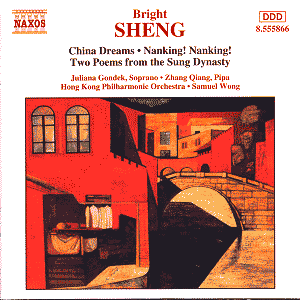As with some of his contemporaries, all in their
late forties (Zhou Long, Chen Yi, Qigang Chen, to name but a few),
Bright Sheng attempts a reconciliation of Eastern and Western
musical traditions while avoiding ready-made formulae. Their approach
is on the whole quite similar to Bartók’s or Kodaly’s but
Sheng seems closer to Bartók than to Kodaly. He has sometimes
been nicknamed "the Chinese Bartók", which has
more than a grain of truth. This is particularly evident in the
earliest work recorded here, Two Poems from the Sung Dynasty
for soprano and orchestra. He withdrew a number of early works
from that period, which he regarded as immature. Though he obviously
had some doubts about this song cycle, he eventually decided to
acknowledge it because "there is something in it which still
speaks [to me] in a special way". Both poems are love songs
which he sets in a rather expressionistic way that perfectly suits
the poems’ words and their political and historical background.
At the time these poems were written, China was invaded by the
Mongolians and the poet’s husband died during the war. This beautiful
short song cycle may be somewhat more ‘modern’ (Bartók
may have been lurking around the corner) than the other works
recorded here; but I believe that this is by far the finest and
the most gripping piece in this selection.
China Dreams assembles four pieces
composed between 1992 and 1995 in response to various commissions,
though the composer admits that, from the start, they were undoubtedly
meant to form a single work. The first two movements (Prelude
and Fanfare) are fairly short whereas the third (The
Stream Flows) and the fourth (The Three Gorges of the Long
River) are rather more complex and more developed. All four
movements borrow Chinese folk material, again much in the same
way as Bartók - no mere rhapsodising on folk tunes. The
piece opens with a beautifully atmospheric Prelude followed by
a brilliant Fanfare, both based on tunes from various parts of
China. The third movement, the real gem in this fine work, is
a superb piece of string writing developing a tune from the Yunnan
Province. The final movement uses other folk material while developing
music heard in the Prelude, thus bringing some unity to what may
at first glance have seemed rather disparate. This is well-crafted,
superbly scored and highly communicative music. Incidentally,
this is the second recording of this piece. Another is available
on BIS CD-1122 which I have not heard but which was reviewed here
some time ago.
Nanking! Nanking! (subtitled A
Threnody for Orchestra and Pipa) is altogether more serious
and ambitious. Completed in 2000 and dedicated to Christoph Eschenbach
who conducted the premiere in January 2000, the piece is a heartfelt
and powerful threnody in memory of the victims of the Nanjing
massacres in 1937. Japanese invaders were then responsible for
one of the most brutal massacres in military history, destroying
the ancient capital city and killing, raping and torturing numberless
victims - more than 300,000 Chinese civilians perished during
these massacres. The music is much more violent than in any of
the other pieces. It is also more overtly expressionistic with
very little actual Chinese material, were it not for the lonely
pi-pa desperately battling against large and often loud orchestral
forces. An impressive achievement, even if a bit too long for
its material. The composer’s sincerity and honesty as well as
his deeply human concerns are never in doubt.
Over the last few months I have been reviewing
quite a number of recordings of music by young Chinese composers
which I found most impressive and compelling. This is one of the
many delights of CD reviewing. Until now, Bright Sheng was just
a name to me. Now, this superbly produced release has whetted
my appetite for more of his music. At bargain price, this is a
most desirable release which I warmly recommend to those who may
have delayed their investigation of Sheng’s music so far. Then,
I am sure, you will also want to have the BIS disc. I have already
started looking for it.
Hubert Culot
